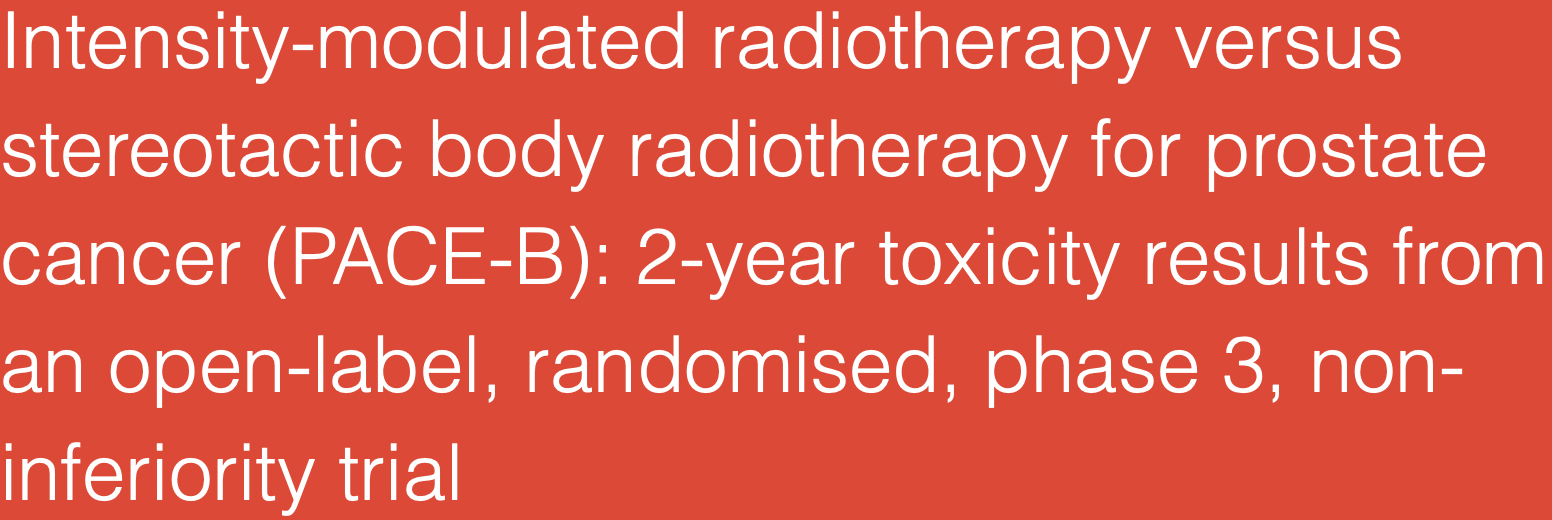How Can Cancer Specialists Continue to Justify Putting a Man Through 12-Weeks of 42 Radiation Therapy Treatments for Prostate Cancer When it Can Be Done in 1-to-2-Weeks with 5 treatments using CyberKnife Radiation Therapy also known as Stereotactic Body Radiation Therapy (SBRT)?
The Latest Research Published in the medical Journal, Lancet Oncology Proves Once Again, CyberKnife is Effective, Safe and Hopefully Will Finally Change the Standard of Care for Prostate Cancer.

The new PACE B Study results could and should make that change because, like other studies it found using 5 SBRT fractions would shorten the treatment time for patients significantly, allowing them to return to their normal lives sooner.
The 12-week toxicity results were published in 2019 with the same conclusion, that the toxicity rates for both treatments were similar.
The 2-year radiotherapy toxicity results showed that the rate of serious side effects from standard radiotherapy and 5 fraction SBRT was very low and the rates were similar for both treatments.
The PACE-B Clinical Trial is comparing 4-to-8 weeks of standard Radiotherapy to 1-to-2 weeks of 5 fraction SBRT for patients with Prostate Cancer who did not receive hormone therapy to see whether treatment time can be reduced.
Here’s the Summary and Background of the Study: Localized prostate cancer is commonly treated with external beam radiotherapy and moderate hypofractionation is non-inferior to longer schedules.
Stereotactic body radiotherapy (SBRT) allows shorter treatment courses without impacting acute toxicity.
We report 2-year toxicity findings from PACE-B, a randomized trial of conventionally fractionated or moderately hypofractionated radiotherapy versus SBRT.
Methods: PACE is an open-label, multicohort, randomized, controlled, phase 3 trial conducted at 35 hospitals in the UK, Ireland, and Canada.
In PACE-B, men aged 18 years and older with a WHO performance status 0–2 and low-risk or intermediate-risk histologically-confirmed prostate adenocarcinoma (Gleason 4 + 3 excluded) were randomly allocated (1:1) by computerised central randomisation with permuted blocks (size four and six), stratified by centre and risk group to control radiotherapy (CRT; 78 Gy in 39 fractions over 7·8 weeks or, following protocol amendment on March 24, 2016, 62 Gy in 20 fractions over 4 weeks) or SBRT (36·25 Gy in five fractions over 1–2 weeks).
Androgen deprivation was not permitted. Co-primary outcomes for this toxicity analysis were Radiation Therapy Oncology Group (RTOG) grade 2 or worse gastrointestinal and genitourinary toxicity at 24 months after radiotherapy.
Analysis was by treatment received and included all patients with at least one fraction of study treatment assessed for late toxicity.
Recruitment is complete. Follow-up for oncological outcomes continues.
The trial is registered with ClinicalTrials.gov, NCT01584258.
Findings: We enrolled and randomly assigned 874 men between Aug 7, 2012, and Jan 4, 2018 (441 to CRT and 433 to SBRT). In this analysis, 430 patients were analysed in the CRT group and 414 in the SBRT group; a total of 844 (97%) of 874 randomly assigned patients.
At 24 months, RTOG grade 2 or worse genitourinary toxicity was seen in eight (2%) of 381 participants assigned to CRT and 13 (3%) of 384 participants assigned to SBRT (absolute difference 1·3% [95% CI –1·3 to 4·0]; p=0·39); RTOG grade 2 or worse gastrointestinal toxicity was seen in 11 (3%) of 382 participants in the CRT group versus six (2%) of 384 participants in the SBRT group (absolute difference –1·3% [95% CI –3·9 to 1·1]; p=0·32).
No serious adverse events (defined as RTOG grade 4 or worse) or treatment-related deaths were reported within the analysis timeframe.
Interpretation: In the PACE-B trial, 2-year RTOG toxicity rates were similar for five fraction SBRT and conventional schedules of radiotherapy.
Prostate SBRT was found to be safe and associated with low rates of side-effects. Biochemical outcomes are awaited.
You can read the full research report here in the medical journal, Lancet Oncology
Prostate Cancer Treatment in Florida:
At CyberKnife Miami located in South Florida we have treated hundreds of prostate cancer patients with great success over the last 20 years using CyberKnife technology.
The research, including many clinical studies have proved its safety and effectiveness for more than 30 years.
As an open-staff facility, any patient can come to CyberKnife Miami for treatment from any where in the U.S. or the world.
Our physicians who use the CyberKnife are trained clinicians in private practice and/or affiliated other with medical and cancer centers.
At CyberKnife Miami we put patients first and guide you through the entire process. We hold your hand every step of the way and leave no questions unanswered so you know exactly what to expect when you come in for treatment.
We pride ourselves in being compassionate and caring, not just to our patients but their entire family.
We not only answer the phone when you call, we return calls.
Getting a cancer diagnosis is tough, but we will help you get through it as easily and quickly as possible.
We are a small private center. You can pull into our parking lot without having to find your way through a medical maze.
We hope you don’t need us, but we’re here if you do.
You can reach us at 305-279-2900.
For all the latest medical news concerning cancer and treatment follow us on FACEBOOK – TWITTER – INSTAGRAM – YOUTUBE & LINKEDIN

